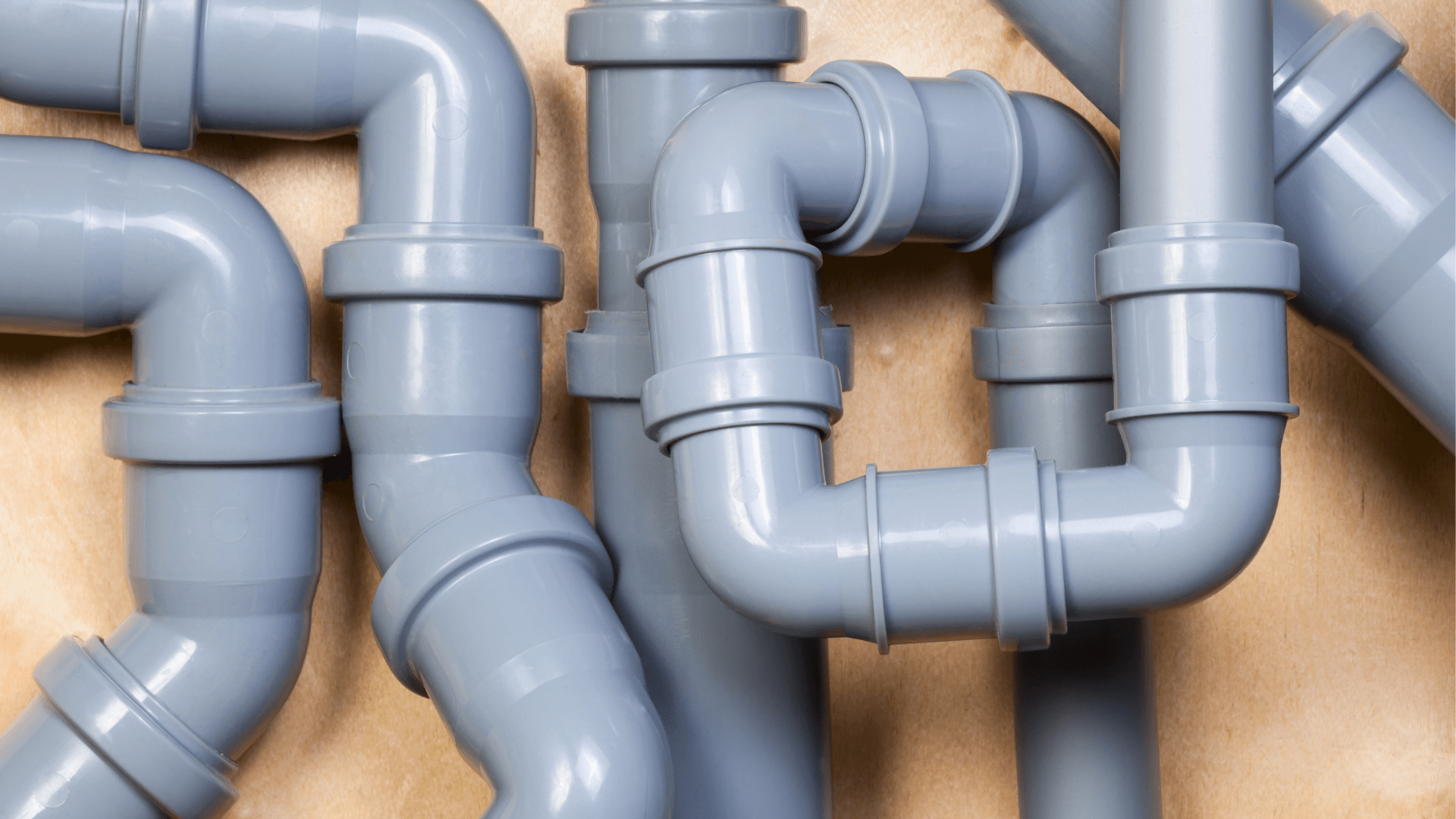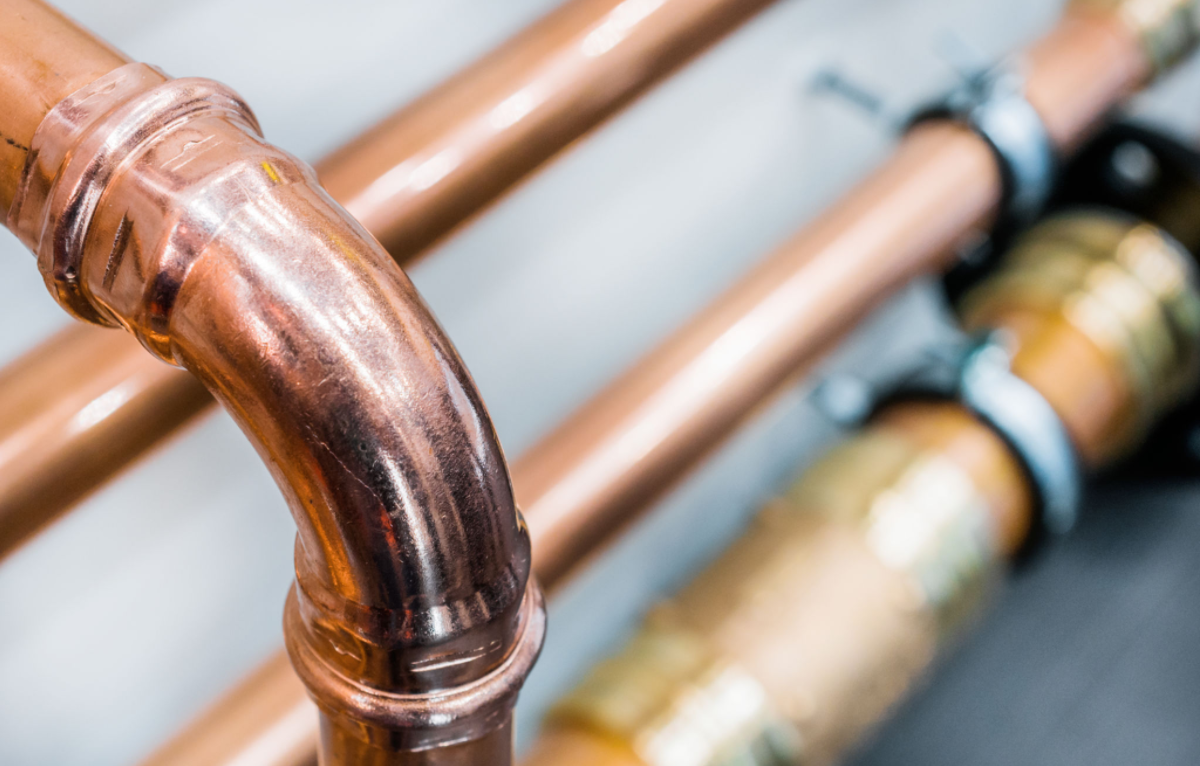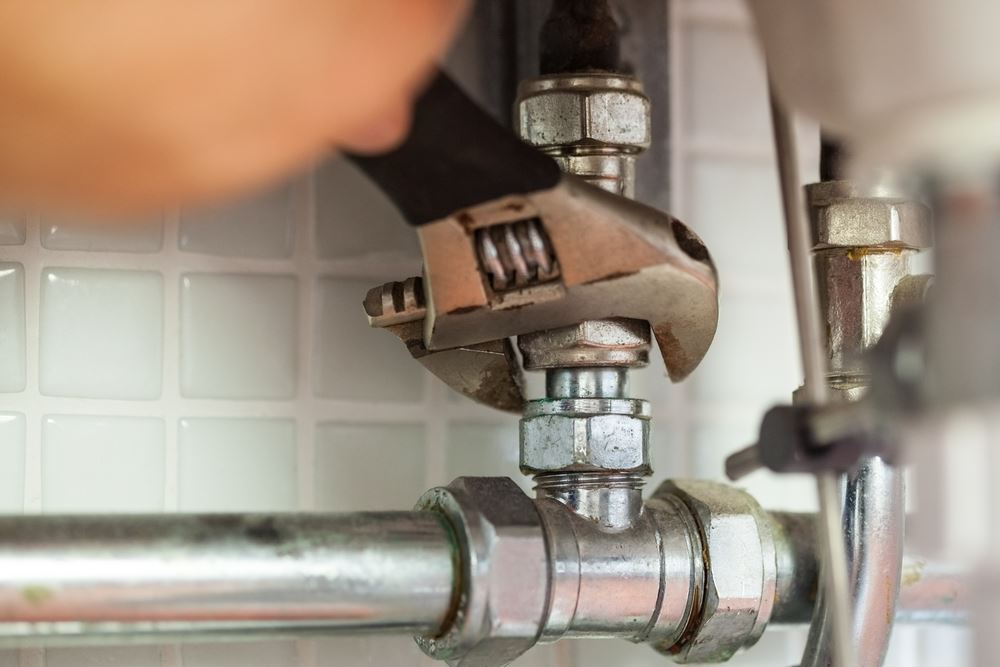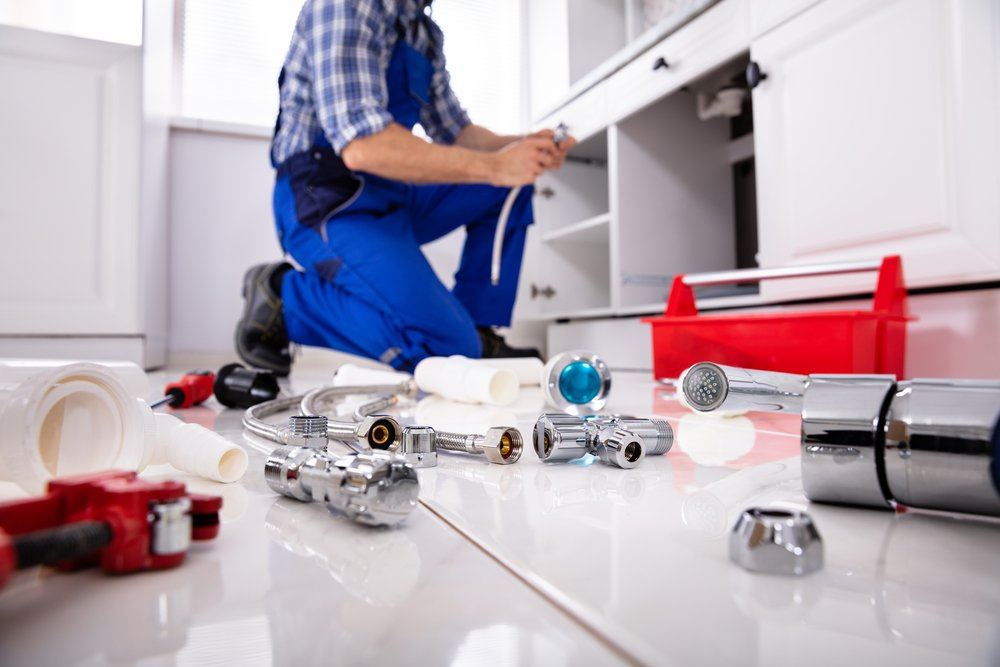Plumbing is the backbone of any building, ensuring water flows seamlessly for drinking, bathing, and beyond. Central to this system are plumbing pipes, each made from different materials and serving unique purposes. Understanding these pipes is essential for homeowners and professionals alike.
In this guide, we’ll explore the world of plumbing pipes, with the help of Service by Scott, from the ubiquitous PVC to the timeless copper. We’ll uncover their characteristics, applications, and benefits, empowering you to make informed choices for your plumbing needs. By the end, you’ll have a clear grasp of the diverse array of pipes that keep our water flowing smoothly.

PVC Pipes
When it comes to plumbing, PVC (Polyvinyl Chloride) pipes are a ubiquitous choice known for their durability and affordability. These pipes are made from a synthetic plastic polymer and are used in both residential and commercial plumbing systems. PVC pipes boast a range of benefits, making them a popular option for various applications.
Characteristics
PVC pipes are renowned for their durability, withstanding different temperatures and pressures without compromising their structural integrity. This durability ensures long-term reliability, reducing the need for frequent repairs or replacements. Additionally, PVC pipes are lightweight and easy to handle, simplifying installation processes and minimizing labor costs.
Common Uses
In residential plumbing, PVC pipes are commonly used for water supply lines, drainage systems, and vent stacks. Their corrosion-resistant properties make them ideal for transporting both cold and hot water, ensuring safe and efficient plumbing operations. PVC pipes are also favored for irrigation systems, providing reliable water distribution for gardens, lawns, and agricultural fields.
Overall, PVC pipes offer a cost-effective and reliable solution for various plumbing needs, making them a staple in the industry. Whether you’re undertaking a new construction project or renovating an existing property, PVC pipes provide the durability and versatility required for long-lasting plumbing systems.

Copper Pipes
Copper pipes have stood the test of time as a reliable and durable option for plumbing systems. With their inherent strength and corrosion resistance, copper pipes have been used for decades in both residential and commercial applications. Let’s explore the characteristics and common uses of copper pipes, highlighting their unique advantages in plumbing.
Characteristics
One of the key characteristics of copper pipes is their exceptional longevity. Unlike other materials that may degrade over time, copper pipes can last for decades, providing reliable water distribution with minimal maintenance. Additionally, copper is highly resistant to corrosion, ensuring that the integrity of the pipes remains intact even in harsh environments or high-pressure systems. These properties make copper pipes a preferred choice for potable water supply lines and heating systems, where reliability is paramount.
Common Uses
Copper pipes have extensive use in residential plumbing for cold and hot water distribution. Their ability to withstand high temperatures makes them ideal for carrying hot water from water heaters to faucets and showers without compromising water quality. In addition to residential applications, copper pipes are utilized in commercial buildings, hospitals, and industrial facilities where sanitation and reliability are critical. Whether potable water supply, heating systems, or refrigerant lines, copper pipes offer performance and durability.
In summary, copper pipes remain a top choice for plumbing systems due to their longevity, corrosion resistance, and versatility. Whether renovating an old home or constructing a new building, copper pipes provide the reliability and peace of mind necessary for a well-functioning plumbing system.
PEX Pipes
PEX (Cross-linked Polyethylene) pipes have revolutionized the plumbing industry with their flexibility and versatility. These innovative pipes offer a range of benefits, making them a popular choice for residential and commercial plumbing applications. Let’s look at the characteristics and common uses of PEX pipes, highlighting their unique advantages in modern plumbing systems.
Characteristics
PEX pipes are celebrated for their flexibility, allowing easy installation in tight spaces and around corners without additional fittings. This flexibility reduces the risk of leaks and minimizes installation time and labor costs. Additionally, PEX pipes are highly resistant to freezing, making them suitable for cold climates where traditional rigid pipes may crack or burst. Their ability to expand and contract with temperature fluctuations ensures reliable performance year-round.
Common Uses
PEX pipes are commonly used for retrofitting existing plumbing systems in residential plumbing and new construction projects. Their flexibility makes them ideal for replacing outdated pipes without extensive demolition or remodeling. PEX pipes are also favored for radiant floor heating systems, providing efficient heat distribution throughout homes and commercial buildings. Moreover, their resistance to corrosion and scale buildup ensures long-term reliability in potable water supply lines and hydronic heating systems.
Overall, PEX pipes offer a modern solution to traditional plumbing challenges, combining flexibility, durability, and ease of installation. When renovating your home or constructing a new building, PEX pipes provide the versatility and performance necessary for a reliable plumbing system.

Galvanized Steel Pipes
Galvanized steel pipes have been a staple in plumbing systems for many years, known for their strength and durability. These pipes are made from steel coated with a layer of zinc to protect against corrosion and rust. While galvanized steel pipes offer certain advantages, they also come with considerations that users should be aware of. Let’s explore the common uses of galvanized steel pipes in plumbing applications.
Characteristics
Galvanized steel pipes are prized for their robustness and strength, making them suitable for high-pressure applications and outdoor use. The zinc coating provides an additional layer of protection against corrosion, extending the lifespan of the pipes even in harsh environments. However, it’s important to note that the zinc coating may deteriorate over time, leading to potential rusting and corrosion issues. Regular inspection and maintenance are recommended to ensure the continued performance of galvanized steel pipes.
Common Uses
In older homes and buildings, galvanized steel pipes were commonly used for water supply lines and drainage systems. Their durability and resistance to corrosion made them a preferred choice for plumbing installations, particularly in areas with aggressive water conditions. Additionally, galvanized steel pipes are still utilized in outdoor applications such as irrigation systems and utility pipelines, where exposure to the elements requires a durable and reliable piping solution.
While galvanized steel pipes have been widely used in the past, it’s important to consider alternative materials such as copper, PVC, or PEX for newer plumbing installations. These materials offer comparable durability with the added benefits of lower maintenance requirements and reduced risk of corrosion. However, for certain applications where strength and longevity are paramount, galvanized steel pipes remain a viable option when properly maintained and inspected.
CPVC Pipes
CPVC (Chlorinated Polyvinyl Chloride) pipes are popular for plumbing systems, particularly where high temperatures are involved. These pipes are made from PVC resin that has been chlorinated to enhance its heat resistance and durability. CPVC pipes offer a range of benefits, making them well-suited for residential and commercial plumbing installations. Let’s explore the characteristics and common uses of CPVC pipes in plumbing.
Characteristics
One of the key characteristics of CPVC pipes is their exceptional heat resistance, allowing them to withstand higher temperatures than standard PVC pipes. This makes CPVC pipes ideal for hot water distribution systems, such as residential plumbing, and commercial applications like hotels and hospitals. Additionally, CPVC pipes are lightweight and easy to handle, facilitating quick and efficient installation processes. Their smooth interior surface minimizes friction and reduces the risk of clogs, ensuring consistent water flow.
Common Uses
CPVC pipes are commonly used in residential plumbing for hot water distribution, particularly in areas where copper pipes may be cost-prohibitive. Their affordability and ease of installation make them a practical choice for retrofitting existing plumbing systems or constructing new homes. In addition to residential applications, CPVC pipes are utilized in commercial and industrial settings for processes requiring hot water, such as manufacturing and food processing facilities. Their resistance to corrosion and scale buildup ensures long-term reliability, even in demanding environments.
Overall, CPVC pipes offer a reliable and cost-effective solution for plumbing systems that require heat resistance and durability. If you’re updating your home’s plumbing or designing a complex industrial process, CPVC pipes provide the performance and peace of mind necessary for a successful installation.

Cast Iron Pipes
Cast iron pipes have a long history of use in plumbing systems, known for their strength and durability. These pipes are made from iron alloyed with carbon and silicon, resulting in a robust material that can withstand high pressures and heavy loads. While cast iron pipes were commonly used in older buildings, they still find applications in modern plumbing systems, particularly for sewer lines and drainage systems.
Characteristics:
One of the key characteristics of cast iron pipes is their exceptional strength and durability, making them suitable for heavy-duty applications. These pipes can withstand high pressures and resist damage from external forces, such as soil movement or traffic loads. Additionally, cast iron pipes have excellent soundproofing properties, reducing noise transmission from flowing water and preventing disturbances within buildings. However, it’s important to note that cast iron pipes can be susceptible to corrosion over time, particularly in acidic soil conditions.
Common Uses:
Cast iron pipes are commonly used in sewer lines and drainage systems, where their strength and durability are essential for carrying wastewater away from buildings. Their resistance to high temperatures and pressure fluctuations makes them suitable for transporting both sanitary and industrial wastewater. Additionally, cast iron pipes are favored for underground installations due to their ability to withstand soil movement and external loads. While newer materials such as PVC and HDPE have gained popularity for sewer applications, cast iron pipes remain a reliable choice for certain projects where longevity and durability are paramount.
In summary, cast iron pipes offer a robust and reliable solution for sewer and drainage systems, providing strength, durability, and soundproofing properties. While newer materials have emerged in the plumbing industry, cast iron pipes still play a role in ensuring the safe and efficient transport of wastewater in residential and commercial buildings.
Conclusion: Understanding Plumbing Pipes
In conclusion, understanding the different types of plumbing pipes is essential for anyone involved in plumbing projects, whether for residential or commercial purposes. From the durability of PVC pipes to the longevity of copper pipes, each material offers unique characteristics and benefits that cater to various plumbing needs. Whether retrofitting an existing plumbing system or embarking on a new construction project, choosing the right type of pipe is crucial for ensuring long-term reliability and performance.
At Service by Scott, we’re committed to providing expert plumbing services to our customers in Woodville, Texas, and beyond. With over 30 years of experience, we have the knowledge and expertise to handle all your plumbing needs, from pipe installations to repairs and maintenance. today to learn how we can help you with your plumbing projects. Trust Service by Scott for all your plumbing needs and experience peace of mind when working with a reliable and dedicated plumbing company.
FAQs
Which type of pipe is best for residential plumbing?
The best type of pipe for residential plumbing depends on various factors such as budget, local building codes, and specific plumbing needs. PVC pipes are commonly used for cold water supply lines, while copper pipes are preferred for hot water distribution due to their heat resistance and durability.
Are PVC pipes suitable for outdoor use?
Yes, PVC pipes are suitable for outdoor use, particularly for irrigation systems and outdoor plumbing applications. However, it’s important to protect PVC pipes from direct sunlight exposure to prevent degradation over time. UV-resistant coatings or enclosures can help prolong the lifespan of PVC pipes used outdoors.
How long do copper pipes last?
Copper pipes have an average lifespan of 50 to 70 years or more, making them one of the longest-lasting plumbing materials available. With proper installation and maintenance, copper pipes can provide reliable water distribution for decades without significant degradation.
Can PEX pipes be connected to copper pipes?
PEX pipes can be connected to copper pipes using transition fittings specifically designed for this purpose. These fittings typically utilize compression, crimp, or push-to-connect connections to create a secure joint between the PEX and copper pipes, ensuring leak-free transitions between different pipe materials.
Do galvanized steel pipes require maintenance?
Yes, galvanized steel pipes require regular maintenance to prevent corrosion and rusting. Over time, the zinc coating on galvanized steel pipes may degrade, leading to potential issues such as leaks and reduced water flow. Periodic inspections and protective coatings can prolong the lifespan of galvanized steel pipes and ensure their continued performance.

